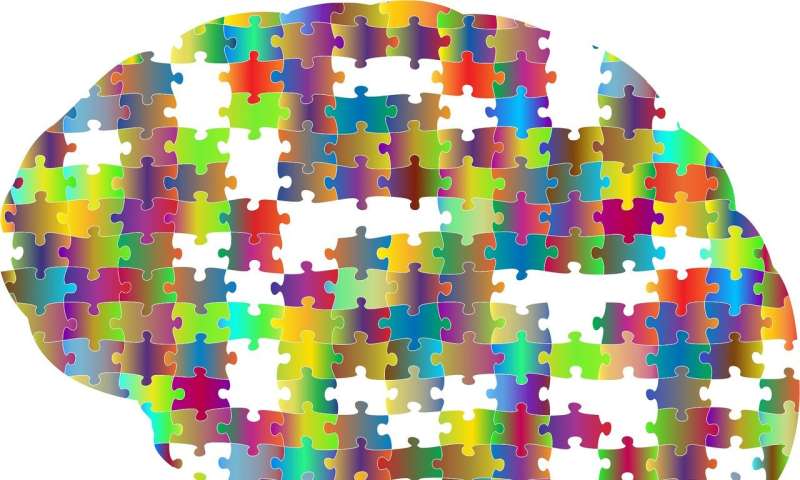Credit: CC0 Public Domain
Exercise, good nutrition and other steps can lower your risk of heart disease. Those same steps can also improve your brain health.
Some of the same risk factors affecting cardiovascular health are closely associated with the health of the brain. By embarking on a heart-healthy lifestyle you also are boosting your chances of avoiding the debilitating physical and financial effects of a stroke or dementia.
"It's not sexy. It's planning and discipline and habit," said neurologist Dr. Lee Schwamm, a professor at Harvard Medical School and co-chair of the brain and healthy aging task force of the American Heart Association.
With stroke being the No. 2 killer worldwide and No. 5 in the United States and a leading cause of disability, American Stroke Month in May is a time to call attention to stroke prevention and overall brain health.
An effective approach to heart and brain wellness is Life's Simple 7, a list of behaviors the AHA and American Stroke Association recommended in its 2017 presidential advisory on brain health. The seven are: Get active, control cholesterol, eat better, manage blood pressure, lose weight, reduce blood sugar and stop smoking.
Stroke, dementia and their similarities
Increasingly, scientists are realizing there are similarities between sudden cognitive impairment and loss of physical function after a stroke and the slower, progressive decline associated with Alzheimer's disease.
Vascular disease, referring to blood vessel problems, and its risk factors are often seen in dementia patients.
"Dementia is like a stroke in slow motion," Schwamm said, explaining that small injuries to the brain can occur in different ways over time. These can build on one another, ultimately acting like "a little wildfire that can't be contained."
With a stroke, symptoms usually come on suddenly. The most common symptoms can be recognized with the help of the acronym F.A.S.T., which stands for face drooping, arm weakness, speech difficulty, and time to call 911.
Other signs of a stroke may be more subtle, such as unexpected falling or a painfully severe headache, Schwamm said.
When stroke symptoms occur, seek immediate medical help. In many cases, a stroke caused by a clot blocking blood flow to the brain can be treated with the clot-busting drug alteplase. The sooner it's administered the more effective it can be, but generally alteplase can be used in the first three hours after stroke.
Brain health defined
Having a healthy brain means being able to pay attention, receive and recognize information, learn and remember, solve problems and make decisions, support mobility, and regulate emotions, according to the AHA/ASA presidential advisory.
Of the preventive measures on the Life's Simple 7 list, the importance of exercise cannot be overstated, said Schwamm, who is executive vice chair of neurology and director of the Comprehensive Stroke Center at Massachusetts General Hospital.
He tries to help his patients begin to view exercise as a gift, not a chore.
A commitment to physical activity is a lot like other routines, such as paying bills, getting dressed for work, or getting children off to school. It's important, so you find the time to make it happen every day.
Exercise doesn't have to involve expensive gear or gym memberships. It can be as simple as brisk walking or jogging. And you can start out with short exercise sessions.
"The point is not to climb Mount Everest on your first day," Schwamm said. The main thing is to get physically active and not quit.
Many people wrongly believe they can keep living a fruitful life if they have their mental faculties even if they are physically impaired, he said.
"This is a false dichotomy," he said. "The two are inextricably linked."
Financial impact
Along with potential physical effects, the financial cost of stroke and dementia can be huge.
In 2017, more than 16 million Americans spent an average of 21.9 hours per week caring for family members with dementia, with an estimated cost as high as $232 billion annually, according to a 2018 Alzheimer's Association report.
The costs that may be incurred after an Alzheimer's diagnosis include such things as medical treatment, care and prescriptions, according to the Alzheimer's Association. Because of the expense, putting a financial plan in place as soon as possible can help secure your financial future.
Family members and caregivers can seek help with financial strategies as they assist a loved one who has Alzheimer's or another form of dementia.
The big picture
Even though stroke and cognitive decline aren't completely preventable, embarking on a heart- and brain-healthy lifestyle can be thought of as an investment in a family's physical, emotional and financial well-being.
The Alzheimer's Association and the Centers for Disease Control and Prevention have developed the "Healthy Brain Initiative," a series of statements on how public agencies can work to improve cognitive health in the nation's aging population.
It's also important to remember that brain health can be considered in a larger context to include emotional well-being and happiness.
Maintaining social interactions with others, experts say, is one of the best ways to keep yourself happy and your brain active and healthy.
Provided by American Heart Association






















